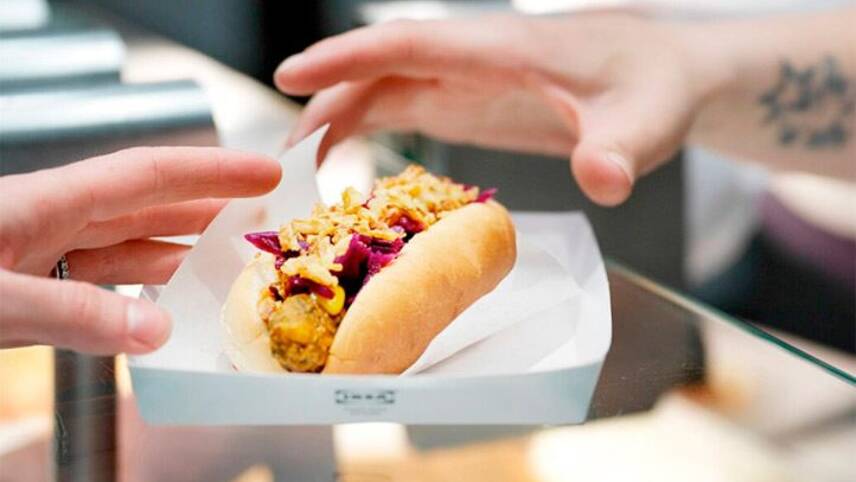Register for free and continue reading
Join our growing army of changemakers and get unlimited access to our premium content

Pictured: Ikea's veggie hot dog
Ikea is best-known for its flat-pack furniture but is also one of the largest food providers in the world. In 2019, more than 680 million people purchased food at one of the company’s restaurants.
In a statement, Ikea said that the new options would be as affordable as existing meals and snacks. The statement confirms that Ikea’s motivation for developing the new targets were the health and environmental benefits of eating less red meat and more plant-based foods.
On the latter point, the global livestock industry is estimated to account for 15% of global annual emissions and to use 83% of all existing agricultural land. Moreover, only 28% of the world’s largest 60 intensive farming firms having to set any plans for climate risk mitigation.
While beef produced in regions like the UK is likely to be lower-carbon than beef from Brazil or the US – two of the world’s biggest producers – it is still resource-intense to produce. The Committee on Climate Change has recommended that UK residents should eat 20% less red meat by 2050.
Ikea has already released vegan-friendly hot dogs meatless meatballs in its restaurants in several key geographies. It claims that the plant-based meatball, the Huvudroll, has just 4% of the climate impact of its beef counterpart.
It will now work to roll these options out in additional restaurants and to develop new recipes. For dishes that still contain meat or fish in 2025, Ikea is targeting a lower environmental footprint. Just two in ten main meals sold in 2025 will contain red meat, so more chicken and fish dishes will also be developed.
“Ikea wants to make healthy and sustainable choices the most desirable option, by for example demonstrating that plant-based food can be really delicious,” Inter Ikea Group’s chief sustainability officer Lena Pripp-Kovac said.
“Research confirms the importance of making sustainable products affordable and desirable, and Ikea can really make a positive difference here.”
To Pripp-Kovac’s latter point, a recent Globescan survey of 27,000 people in 27 nations found that the majority of meat-eaters said they were deterred from eating more plant-based foods due to concerns about taste, cost and nutritional value. Ikea’s broader ‘Live Lagom’ sustainability communications approach is focussed around making low-impact products accessible and discouraging overconsumption.
Unilever’s next steps
In related news, Unilever-owned brand Knorr has partnered with Wageningen University & Research to develop a new research programme centred around environmentally sustainable, nutritious plant-based food.
Called the Good Food Lab, the initiative will seek to understand the full environmental and social impacts of food systems and to develop recommendations for transforming them.
The launch of the lab builds on Knorr’s work with WWF. In 2019, the partnership launched a Future 50 Foods report listing 50 plant-based foods which purport to have a lower impact on the environment – in terms of emissions, soil health, water use and yield – than animal products and most other plants. The report went viral.
Since then, the brand has pledged to increase the amount of products in its portfolio that feature Future 50 Foods by 25% by 2025. Ingredients range from those commonly available in supermarkets, like beans and other pulses, to cacti.
Its learnings have also proven useful to Unilever’s broader portfolio; the FMCG giant recently set a €1bn sales target for plant-based meat and dairy alternatives for 2025.
Unilever was named as a leader in the alternative proteins transition in a recent publication from investor coalition FAIRR. It is one of the 40% of large food and beverage businesses with dedicated plant-based food teams, alongside the likes of Nestle, Sainsbury’s, Tesco, Kroger, Coles and Marks and Spencer (M&S).
Sarah George


Please login or Register to leave a comment.